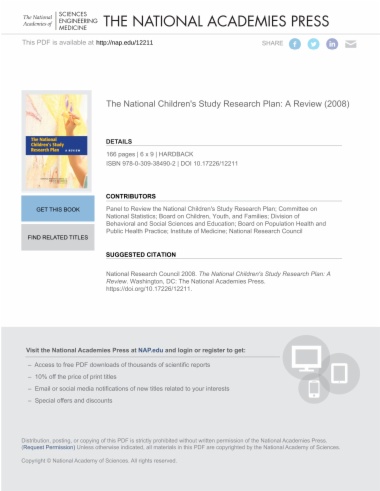The National Children’s Study (NCS) is planned to be the largest long-term study of environmental and genetic effects on children’s health ever conducted in the United States. It proposes to examine the effects of environmental influences on the health and development of approximately 100,000 children across the United States, following them from before birth until age 21. By archiving all of the data collected, the NCS is intended to provide a valuable resource for analyses conducted many years into the future.
This book evaluates the research plan for the NCS, by assessing the scientific rigor of the study and the extent to which it is being carried out with methods, measures, and collection of data and specimens to maximize the scientific yield of the study.
The book concludes that if the NCS is conducted as proposed, the database derived from the study should be valuable for investigating hypotheses described in the research plan as well as additional hypotheses that will evolve. Nevertheless, there are important weaknesses and shortcomings in the research plan that diminish the study’s expected value below what it might be.
- Cover
- Front Matter
- Executive Summary
- 1 Introduction
- 2 NCS Goals, Conceptual Framework, and Core Hypotheses
- 3 Priority Outcome and Exposure Measures
- 4 Study Design, Data Collection, and Analysis
- 5 Ethical Procedures and Community Engagement
- 6 Conclusions and Recommendations
- References
- Biographical Sketches of Panel Members

